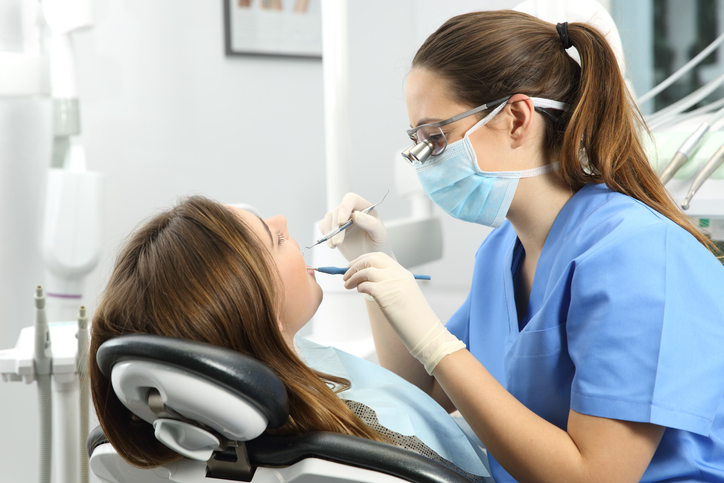-
Oral Care When the Flu or a Cold Strikes

When you have a cold or the flu, your oral health may also suffer. Not only can having respiratory symptoms make your mouth taste bad and your breath feel less than fresh, but you also may not feel like getting up and brushing and flossing as normal. However, taking care of your oral health is an essential part of getting better. These tips will help you get through your illness with your oral health intact.
Use Sugar-Free Cough Drops
Cough drops can help to ease your coughing and congestion when you have a cold or the flu, but be sure to pick ones that are sugar-free to protect your teeth. Regular cough drops are like pieces of candy, and when you suck on them, the sugar will build up on your teeth and feed bacteria. Check the label for ingredients like fructose and corn syrup, and opt for ones that say sugar-free on the package. If you can’t find any sugar-free versions of cough drops, limit your consumption of them and brush your teeth after eating one.
Stay Hydrated
Hydration is always important when you are sick. In addition to helping your body heal, it also helps you avoid developing dry mouth. Dry mouth is a common problem when you’re taking cold and flu medications, because the antihistamines in these products can dry you out. Water is the best option, but tea without sugar, honey, or lemon will also help to prevent dry mouth without increasing your risk for cavities.
Brush and Floss as Normal
You may not feel like brushing and flossing, but it is important to do so, even when you’re feeling sick. You may even find that brushing and flossing helps your mouth feel fresh so you feel a little healthier. When your body is already fighting your cold or flu infection, adding gum disease or tooth decay into the picture will only prolong your illness.
At your next dental exam and teeth cleaning in Hazlet, ask your dentist at Glenwood Premier Dental about more ways you can protect your oral health for life. We treat everything from loose teeth and bad breath to gum disease and cosmetic problems. To make an appointment, call us at (732) 264-4477.
-
What Is a Dry Socket?

One of the potential side effects of having a tooth extracted is a dry socket. Your dentist will tell you things that you can do to prevent a dry socket as you recover. If you think you could be developing one, call your dentist as soon as possible so that he or she can provide treatments to alleviate the pain and promote healing.
Dry sockets occur when the clot that forms over the socket where your tooth stood is displaced. When the clot moves, the nerves and bones are exposed, which can be painful. Smoking or using a straw before the site of the extraction is healed increases the risk of developing a dry socket. If you have a dry socket, your dentist can use a medicated dressing to fill the socket and may recommend taking pain medications to ease the discomfort.
When you have a tooth extracted at Glenwood Premier Dental, our dentist will provide detailed aftercare instructions to help you recover quickly with a minimal risk of complications. For professional dental care in Hazlet, call us today at (732) 264-4477.
-
Quitting Smoking Before Dental Implant Surgery

If you have missing teeth, dental implants provide a natural-looking replacement to help you feel more confident in your smile. They don’t require any of the special cleaning methods or dietary changes that dentures do, and they won’t move around in your mouth. However, if you are undergoing dental implant surgery and you are a smoker, your dentist will likely ask you to quit before your procedure. Here is why quitting is important and what you can do about it.
Why Quitting Before Dental Implant Surgery Matters
Any time you have surgery, smoking can interfere with a healthy recovery. It can cause problems with blood clotting and make you more prone to infection. With dental procedures, smoking also increases the risk of developing a painful dry socket. Smoking is associated with a wide range of oral health problems, including gum disease and tooth decay, so smoking after an oral surgery can have a serious impact on your healing.
In addition, a recent study on dental implant patients showed that people who smoke have a higher risk of dental implant failure. Researchers followed dental implant recipients for five years, and they had an implant failure rate of 15.8%. The failure rate in non-smokers was 1.4%.
Suggestions for Quitting Smoking
If you’re having dental implant surgery and you want to quit, talk to your dentist. He or she may be able to offer resources that can help. Your doctor may also be able to prescribe medications that help to control your cravings or recommend other strategies that may be helpful to you.
You don’t have to quit cold turkey, though some people do. Today, there is a wide range of quit aids that help you step down your tobacco usage and manage your withdrawal symptoms.
If you have missing teeth, talk to your dentist at Glenwood Premier Dental today to find out if you are good candidate for dental implants. Your dentist can also explain how your smoking could impact your treatment and offer suggestions to help you quit. Learn more about dental implants in Hazlet by calling (732) 264-4477.
-
A Look at Laser Dentistry and Gum Disease
Gum disease is a serious threat to your oral health and your overall well-being. At Glenwood Premier Dental, we are pleased to give patients a cutting-edge treatment option using laser dentistry.
Watch this video to learn more about laser dentistry. By using laser treatments, your dentist can alleviate the infections and deep pockets that occur with gum disease in a single treatment session, with much less pain and recovery time.
To find out if laser dentistry is right for you, make an appointment at Glenwood Premier Dental for a consultation. You can schedule your visit with our dentist in Hazlet by calling (732) 264-4477.
